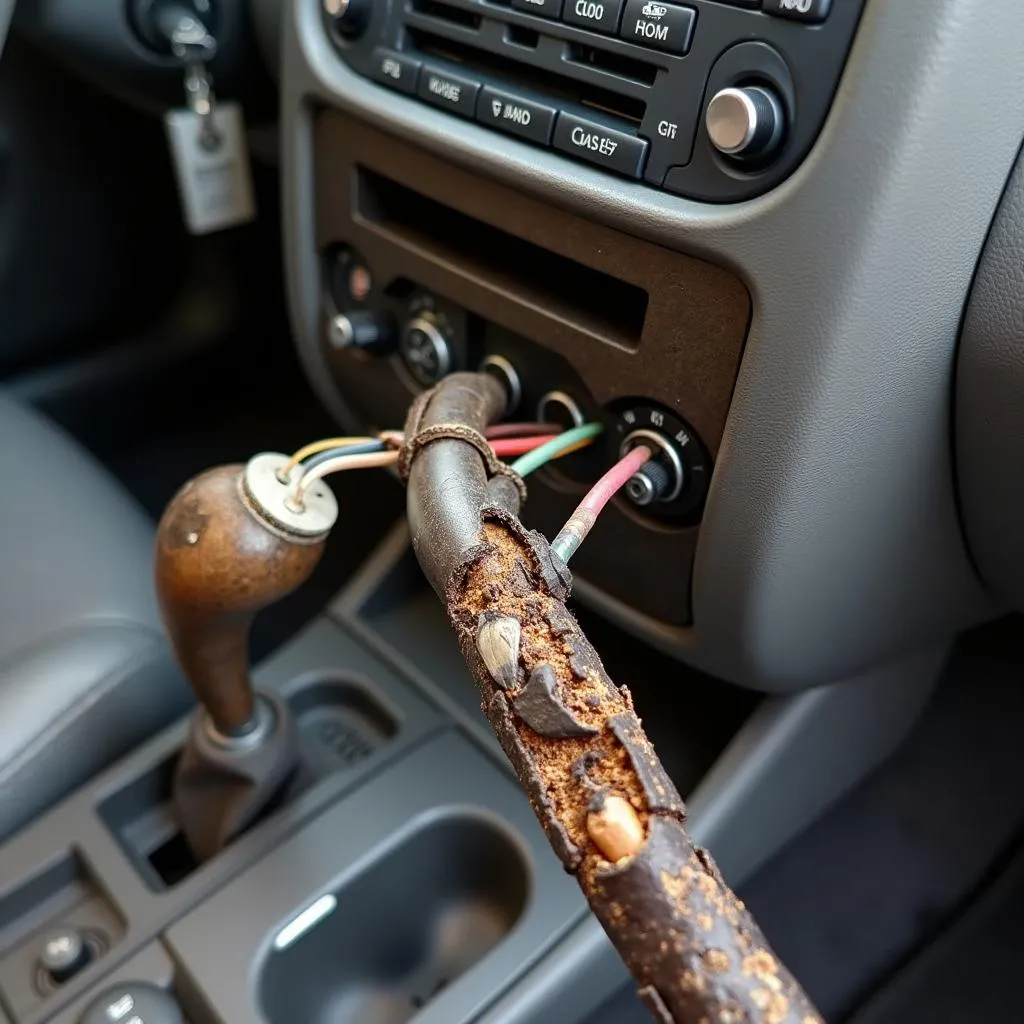The red “Parking Brake” warning light on your W203 Mercedes-Benz dashboard can be a cause for concern, especially when it refuses to go away. While the most common reason is simply forgetting to release the parking brake, several other culprits might be at play. This comprehensive guide will explore the potential causes behind a persistent W203 parking brake warning and provide practical solutions to help you get back on the road with peace of mind.
Understanding the W203 Parking Brake System
Before diving into the troubleshooting process, it’s crucial to understand how the parking brake system on your W203 operates. Unlike traditional handbrake systems, the W203 utilizes an electronically controlled system. Pressing the parking brake button activates an electric motor, which pulls cables that engage the rear brake calipers, effectively locking the rear wheels.
Common Causes of a W203 Parking Brake Warning
-
Engaged Parking Brake: As obvious as it might seem, the most common cause is an engaged parking brake lever. Double-check the lever to ensure it’s fully released.
-
Faulty Brake Light Switch: The brake light switch plays a crucial role in disengaging the parking brake warning. If faulty, it can send incorrect signals to the car’s computer, leading to a persistent warning light.
-
Worn Brake Pads or Rotors: Excessively worn brake pads or rotors can trigger the parking brake warning light, especially if the wear indicator sensors are activated.
-
Low Brake Fluid Level: Insufficient brake fluid level can compromise the entire braking system, including the parking brake, and activate the warning light.
-
Malfunctioning Parking Brake Actuator: The parking brake actuator is responsible for engaging and disengaging the parking brake. A malfunctioning actuator can prevent the system from releasing properly, causing the warning light to stay on.
-
Electrical Issues: Wiring issues, corroded connectors, or a faulty parking brake control module can disrupt the flow of signals within the parking brake system, triggering the warning light.
Troubleshooting a W203 Parking Brake Warning
If the warning light persists even after checking the parking brake lever, it’s time to investigate further.
-
Check Brake Fluid Level: Locate the brake fluid reservoir under the hood and inspect the fluid level. If it’s below the minimum mark, add the recommended brake fluid type until it reaches the maximum line.
-
Inspect Brake Pads and Rotors: Visually inspect the thickness of your brake pads through the wheel spokes. If they appear excessively thin or you notice any scoring on the rotors, consult a qualified mechanic for further inspection and potential replacement.
-
Scan for Fault Codes: Using a compatible OBD-II scanner, retrieve any stored fault codes related to the parking brake system. These codes can provide valuable insights into the root cause of the issue.
-
Test the Brake Light Switch: Locate the brake light switch above the brake pedal. With the ignition off, depress and release the brake pedal while listening for a clicking sound. If the switch is functioning correctly, you should hear a distinct click with each press and release.
-
Inspect the Parking Brake Actuator: Access the rear wheel assembly and locate the parking brake actuator. Check for any visible signs of damage or corrosion on the actuator and its connecting cables.
Seeking Professional Assistance
If your troubleshooting efforts prove unsuccessful or you’re uncomfortable working on your car’s braking system, it’s crucial to seek professional assistance from a qualified Mercedes-Benz technician. They possess the expertise, diagnostic tools, and specialized equipment to accurately diagnose and resolve the issue safely and effectively.
Remote Diagnostics and Software Solutions
Advancements in automotive technology have paved the way for remote diagnostics and software solutions that can address certain parking brake warning issues. Contacting a specialized service provider offering remote diagnostics for Mercedes-Benz vehicles can be beneficial. They can remotely connect to your car’s computer system, retrieve fault codes, analyze data, and potentially resolve software-related glitches that might be triggering the warning light.
Conclusion
A persistent W203 parking brake warning should never be ignored. Addressing the issue promptly ensures your safety and prevents further damage to your vehicle’s braking system. By understanding the potential causes, performing basic troubleshooting steps, and seeking professional help when needed, you can effectively resolve the problem and restore your peace of mind behind the wheel.

